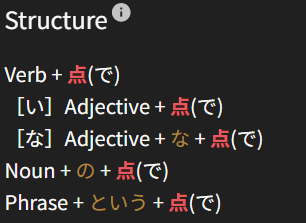I just learnt about them today.
Attributive/Predicative forms

Looking at the “Structure” section

Why not just replace it with:
- attributive form + 点(で)
Instead of remembering 4 rules, now I only have to remember one.
It might also helps with confusion about when to use だ, な, and の after a noun.
I was frequently mis-remembering what to use…
点(で) Grammar point - You use の after a noun because it needs the Attributive form.
けど Grammar point - You use だ after a noun because it needs the Predicative form.
のに Grammar point - You use な after a noun because it needs the Attributive form of a full sentence. Sentences don’t end with a noun. Instead, you do noun + だ. The Attributive form of だ is
な.


